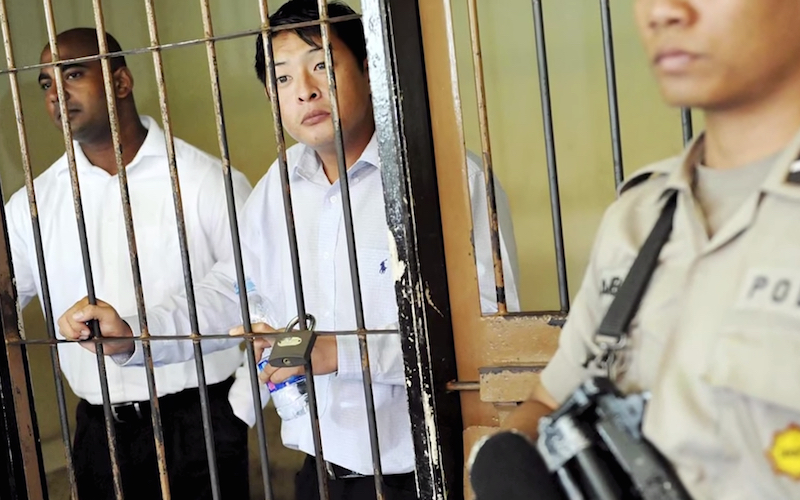
Bali Nine: The Death Penalty Debate and Poster-Boys
The execution of Andrew Chan and Myuran Sukumaran along with six others on charges of drug trafficking has triggered an international outcry that has unearthed issues regarding the death penalty as well as issues of sovereignty, igniting debates over the rights of the individual against those of the state to determine the laws of the land. The executions of the two Australians has led to Australia recalling its envoy from Indonesia, with Tony Abbot calling the execution “cruel and unnecessary” and calling the episode “a dark moment in the relationship.” He further noted that the relationship between the two countries had “suffered” as a result. The issue is a complex one, mired understandably in heightened emotions and an outpouring of sympathy, as well as the need for the leaders of both countries to both protect the rights of their citizens as well as the sovereignty of the state to implement its laws.
President Widodo especially, is driven by a need to seem tough and decisive, a perception that has plagued him since his ascendency to the Presidency. He is currently in an especially fragile position, with a dip in popular support and ratings, propelled by policy failures and controversial official nominations. He has also been plagued by allegations of having little say within his own party, itself afflicted by internal strife. Critics have long claimed that Widodo is a “puppet president,” with the president of his party, Megawati Sukarnoputri believed to be the real key decision maker. This perception has been fuelled by Megawati publicly urging Widodo “not to grant clemency.”
While Widodo claims that his tough stance is largely reflective of the “drug emergency” the country is facing, there is strong reason to believe that he is using international pressure as a means to showcase his tough personality to the Indonesia public that has historically been supportive of the death penalty.
The issue of sovereignty and the need to project a strong image as a regional leader has long been an important aspect of Indonesian politics, and sadly, the pressure to do so seems to have been an important factor in President Widodo’s decision to deny clemency and proceed with the executions.
While the spectre of political jostling does play a key role in understanding the rationale behind the executions, the episode has also stimulated the long running debate on the death penalty and its place in modern states as a means of punishing grave crimes.
It is essential to note at the onset that it is impossible to accept wholeheartedly the decision that a life must be taken. Even the most vociferous proponents of the death penalty would find it hard to argue that there should be no sympathy and regret that such a decision has been taken and that a life will be forcibly taken. So there is every justification for lighting a candle in sympathy for their pain. There is every justification that we grieve with their families, the real victims of a tragedy that they never engineered. There is also every justification that we shall continue to debate the need for the death penalty as a means of punishment.
Indeed we must continue to debate what the basis for punishment is in the societies we live in. Is the motive behind punishment revenge, rehabilitation or deterrence? These are important debates that the international media must continue to host and crucial questions that states must continually attempt to answer. If the collective conscience in these states replies with a resounding response that revenge and deterrence are no longer good enough reasons to demand a life, then the laws of the land must be changed to reflect the will of the people.
However, it is worth considering that when we do offer sympathy, show our disdain for the death penalty or laws that we fundamentally disagree with, we do so in a responsible fashion that does not end up negating or diminishing the heinous crimes that are often committed by the sentenced criminals. We must not make martyrs out of those whose actions have posed a grave threat to society. Andrew Chan and Myuran Sukumaran were ringleaders of a syndicate that planned to smuggle 8.3 kg (18 lb) of heroin valued at around $4 million from Indonesia to Australia.
They did so on their own volition, fully understanding the penalty for drug trafficking in the country from which they were smuggling. One must also consider that they fully understood the effect 8 kilograms of heroin would have on the streets of Sydney; the potential carnage it would wreck on a multitude of lives. That was a risk they were willing to take and a cost they were willing to impose on society for $4 million dollars.
The argument being made here is that there is a need for responsible advocacy and debate. We must not diminish the grave and unacceptable actions of death penalty convicts while advocating that the death penalty has no place in modern society or that its claims of being a deterrent is steeped in archaic conceptualisations of the role of the state. While we grieve the tragedy of the loss of their lives, Chan and Sukumaran must not be held up as poster boys for the argument against the death penalty. There are far more worthy candidates languishing in jails, awaiting the death knell to be rung by the state. Many of them are truly innocent and some are victims of circumstances that rendered them helpless or they were in desperate circumstances. These are the real victims, along with the families that struggle to recover from the loss of a loved one. I will light a candle for them instead.
